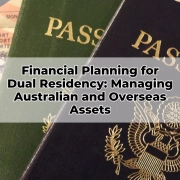What is a Binding Financial Agreement, and How Does it Affect Superannuation?
Table of Contents
ToggleA Binding Financial Agreement (BFA) is a legally binding document that outlines how assets, liabilities, and financial resources, including superannuation, will be divided between partners in a relationship if the relationship ends. Governed by the Family Law Act 1975, BFAs can be established before, during, or after a relationship. Often referred to as “prenups” or “postnups,” they offer a private alternative to court-determined financial settlements. While BFAs are often associated with protecting wealth or ensuring equitable division of property, their implications for superannuation—one of the most valuable assets for Australians—are particularly significant. Superannuation balances are considered property under Australian law and are therefore subject to division in separation or divorce. Understanding how BFAs address superannuation is critical for couples seeking to safeguard their retirement savings and manage financial expectations.
What is a Binding Financial Agreement?
A Binding Financial Agreement is a legal tool designed to provide clarity and certainty about how financial matters will be resolved if a relationship ends. Unlike court orders, BFAs are private agreements, meaning they do not require court approval, though they must meet strict legal requirements to be enforceable. These agreements can be tailored to reflect the unique circumstances of each couple, offering flexibility in addressing complex financial arrangements. BFAs are applicable to married couples, de facto relationships, and same-sex couples, making them a versatile option for a wide range of relationships in Australia.
BFAs can be created at different stages of a relationship. A pre-relationship agreement, often called a “prenup,” is designed to establish terms before a marriage or de facto relationship begins. Agreements created during a relationship allow couples to formalise financial arrangements while the partnership is ongoing. Finally, post-separation BFAs are often used to avoid lengthy court battles, providing an agreed-upon framework for dividing assets after the relationship ends. Regardless of the timing, the role of a BFA is to provide a roadmap for asset division, ensuring that both parties have clear expectations and reducing the risk of disputes.
How Superannuation is Treated in Australian Family Law
Under Australian family law, superannuation is treated as property. However, unlike other forms of property, such as cash or real estate, superannuation is subject to unique rules because it is typically inaccessible until retirement age. When a relationship ends, the Family Court can issue orders to divide superannuation entitlements. These divisions may occur through a “splitting order,” which allocates a portion of one party’s superannuation balance to the other party, or a “flagging order,” which delays the division until a specific event, such as retirement, occurs.
The valuation of superannuation can vary depending on the type of fund. For example, accumulation funds, which are the most common in Australia, can be straightforward to value based on the account balance. However, defined benefit schemes, which provide retirement income based on years of service and salary, may require actuarial assessments to determine their value. This complexity underscores the importance of addressing superannuation in any financial agreement, including BFAs.
How Does a BFA Address Superannuation?
A Binding Financial Agreement can play a critical role in defining how superannuation will be treated in the event of a relationship breakdown. For couples, superannuation often represents a significant portion of their wealth, making it a vital consideration in any financial arrangement. A BFA can specify how superannuation entitlements will be divided, offering a tailored approach that reflects the couple’s individual circumstances. For example, one party may agree to transfer a portion of their superannuation balance to the other party to ensure an equitable distribution of assets.
In some cases, a BFA can be used to protect superannuation from division altogether. This is particularly relevant for individuals who wish to preserve their retirement savings, such as those with substantial superannuation balances accrued before the relationship began. The agreement can stipulate that superannuation remains with the original account holder, compensating the other party with alternative assets such as cash or property. Additionally, BFAs can consider non-financial contributions, such as caregiving or homemaking, which indirectly support a partner’s ability to grow their superannuation. By addressing these factors, BFAs can create a more balanced and fair settlement.
Legal Requirements for a BFA to Be Valid
For a Binding Financial Agreement to be legally enforceable, it must meet several strict requirements. Both parties must receive independent legal advice before signing the agreement, ensuring they understand its implications, including how it affects their superannuation entitlements. The agreement must be in writing and signed by both parties, and there must be full disclosure of all financial circumstances. Any lack of transparency, such as failing to disclose the true value of superannuation balances, can render the agreement invalid. Additionally, the BFA must comply with the Family Law Act 1975, ensuring it aligns with legal standards for fairness and enforceability.
If a BFA does not meet these requirements, it can be challenged in court. For example, an agreement may be overturned if it was signed under duress, lacked full disclosure, or contained terms that are deemed unconscionable. This highlights the importance of working with experienced legal and financial professionals when drafting a BFA to ensure it withstands scrutiny.
Advantages of Including Superannuation in a BFA
Including superannuation in a BFA offers several benefits. First, it provides clarity and certainty, ensuring both parties understand their entitlements and reducing the likelihood of disputes. For individuals with significant superannuation balances, a BFA can protect these funds from substantial division, preserving retirement savings. This is particularly important for older Australians or those entering second marriages who want to safeguard wealth accumulated before the relationship.
BFAs also allow for flexibility, enabling couples to customise their arrangements to suit their unique needs. For example, a couple may agree to preserve superannuation for retirement purposes while focusing on dividing other assets during separation. This approach can help both parties maintain financial stability and support long-term planning. Furthermore, by addressing superannuation proactively, BFAs reduce reliance on court intervention, saving time, stress, and legal costs.
Challenges and Limitations of BFAs
Despite their benefits, BFAs are not without challenges. Valuing superannuation, especially for defined benefit schemes, can be complex and may require expert assessments. Additionally, once a BFA is signed, it is difficult to amend. If circumstances change significantly, such as one party experiencing a substantial increase in superannuation savings, the agreement may no longer reflect the couple’s intentions. In such cases, resolving disputes may require further legal action.
Another limitation is the risk of invalidity. If a BFA fails to meet legal requirements or is found to be unfair, it can be overturned, leaving superannuation and other assets subject to division under standard family law rules. This underscores the importance of ensuring the agreement is carefully drafted and reviewed by professionals.
Role of Financial Advisers in Structuring BFAs
Financial advisers play a crucial role in helping couples navigate the complexities of BFAs, particularly when superannuation is involved. Advisers can provide valuable insights into the long-term implications of splitting superannuation, considering factors such as retirement planning, tax obligations, and investment growth. For example, an adviser may help determine whether a superannuation split is the most equitable solution or if alternative asset transfers are more beneficial.
Engaging a financial adviser ensures that the agreement aligns with both parties’ financial goals and protects their future interests. For Australians, especially those in regional areas like Toowoomba, working with a local adviser who understands the nuances of superannuation and family law can provide added peace of mind.
Conclusion
Binding Financial Agreements are powerful tools for managing financial arrangements in relationships, offering clarity and flexibility while protecting assets like superannuation. By addressing superannuation proactively, BFAs help couples avoid protracted legal disputes and ensure a fair distribution of wealth. However, drafting a legally sound and comprehensive BFA requires careful consideration and professional advice. For Australians, consulting with legal and financial experts, including a Toowoomba financial adviser, is essential to create an agreement that supports long-term financial security and retirement planning goals. With the right approach, a BFA can provide a solid foundation for financial peace of mind.









